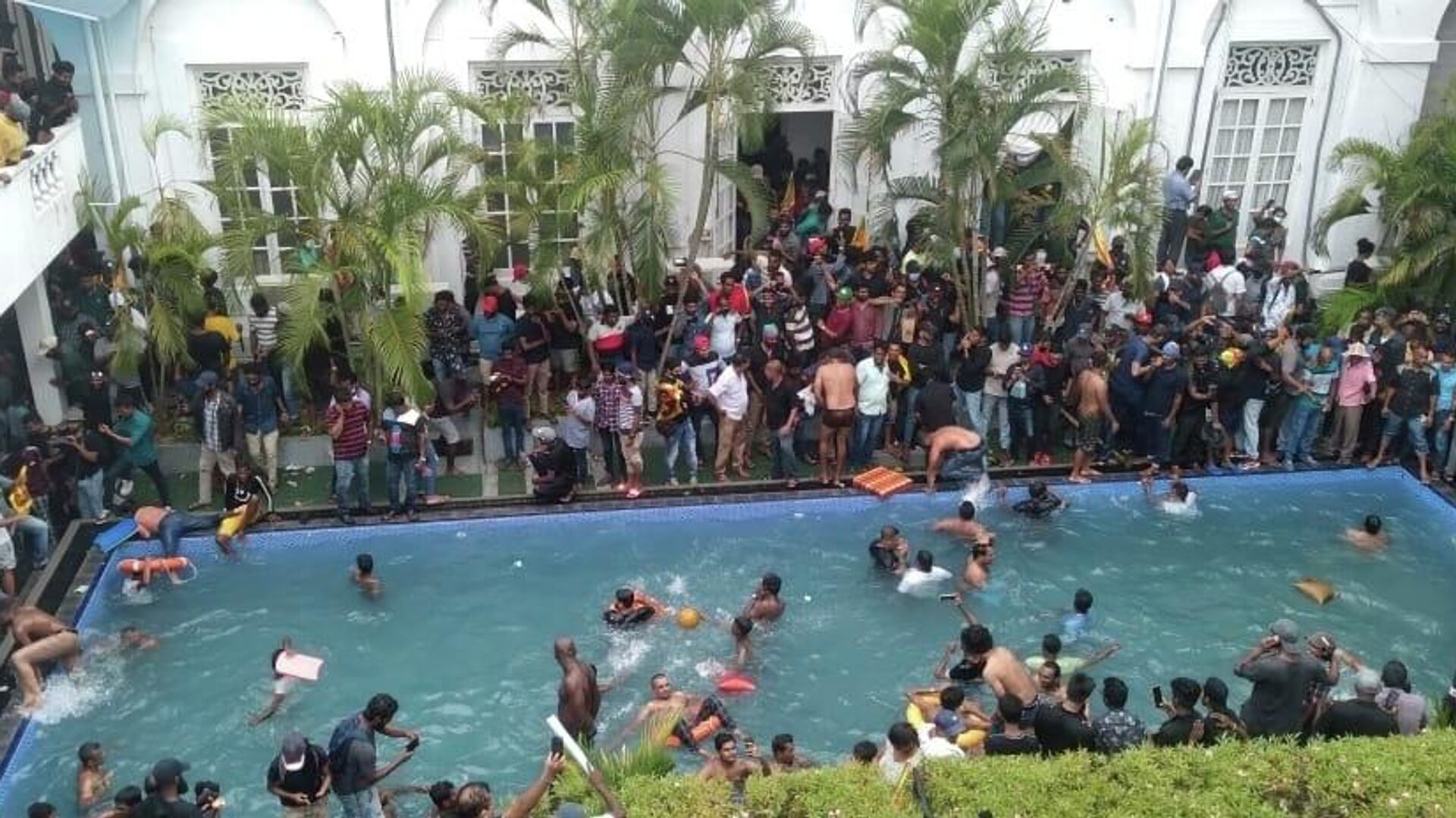https://sputnikglobe.com/20220711/indian-embassy-says-new-delhi-will-not-send-troops-to-sri-lanka-amid-political-turmoil-1097169117.html
Indian Embassy Says New Delhi Will Not Send Troops to Sri Lanka Amid Political Turmoil
Indian Embassy Says New Delhi Will Not Send Troops to Sri Lanka Amid Political Turmoil
Sputnik International
Sri Lankan President Gotabaya Rajapaksa and Prime Minister Ranil Wickremesinghe informed their fellow citizens that they were willing to resign. However... 11.07.2022, Sputnik International
2022-07-11T07:08+0000
2022-07-11T07:08+0000
2022-07-19T10:44+0000
sri lanka
china
gotabaya rajapaksa
ranil wickremesinghe
bailout
bailout deal
https://cdn1.img.sputnikglobe.com/img/07e6/07/0a/1097155843_134:0:959:464_1920x0_80_0_0_fa561c0e67c611ab2edeb21618ae0eb9.jpg
The Indian High Commission in Sri Lanka on Monday bluntly dismissed "speculative" reports that New Delhi would send troops to the island nation, adding that "such views" are not the Indian government's position. The clarification has come as protesters have refused to leave the official residences of the president and prime minister despite the country's armed forces making requests.President Gotabaya Rajapaksa and Prime Minister Ranil Wickremesinghe have yet to submit their papers despite showing a willingness to step down from the post under the pressures of protesters.The president had fled before thousands of protesters stormed the president's official residence on Saturday. The parliamentary speaker said Rajapaksa would resign on the auspicious day of 'Buddha Purnima' (13 July).President Rajapaksa has also not accepted the resignations of Harin Fernando Manusha Nanayakkara Dammika Perera Bandula Gunawardena from the cabinet. On Monday, these ministers will attend a cabinet meeting chaired by Prime Minister Ranil Wickremesinghe.Meanwhile, Sri Lanka's opposition parties are also cobbling together to pick leaders who can replace Rajapaksa and Wickremesinghe to continue negotiating with donors, including the International Monetary Fund (IMF).The first round of negotiation for a bailout package for the "bankrupt" Sri Lankan economy was concluded on 30 June on positive notes from the IMF. The island nation's depleting foreign exchange reserves since the beginning of this year has led to acute shortages of essential items, leaving people struggling to obtain food, fuel, and other necessities. The country has reeled from foreign exchange reserves shortages, essential for imports, as poor economic policy and COVID-19-induced slowdown brought the once a fast developing country into bankruptcy.
sri lanka
china
Sputnik International
feedback@sputniknews.com
+74956456601
MIA „Rosiya Segodnya“
2022
Rishikesh Kumar
https://cdn1.img.sputnikglobe.com/img/07e4/08/04/1080055820_0:0:388:389_100x100_80_0_0_40018ee210946d65d49ffba4f4c008e1.jpg
Rishikesh Kumar
https://cdn1.img.sputnikglobe.com/img/07e4/08/04/1080055820_0:0:388:389_100x100_80_0_0_40018ee210946d65d49ffba4f4c008e1.jpg
News
en_EN
Sputnik International
feedback@sputniknews.com
+74956456601
MIA „Rosiya Segodnya“
Sputnik International
feedback@sputniknews.com
+74956456601
MIA „Rosiya Segodnya“
Rishikesh Kumar
https://cdn1.img.sputnikglobe.com/img/07e4/08/04/1080055820_0:0:388:389_100x100_80_0_0_40018ee210946d65d49ffba4f4c008e1.jpg
sri lanka, china, gotabaya rajapaksa, ranil wickremesinghe, bailout, bailout deal
sri lanka, china, gotabaya rajapaksa, ranil wickremesinghe, bailout, bailout deal
Indian Embassy Says New Delhi Will Not Send Troops to Sri Lanka Amid Political Turmoil
07:08 GMT 11.07.2022 (Updated: 10:44 GMT 19.07.2022) Sri Lankan President Gotabaya Rajapaksa and Prime Minister Ranil Wickremesinghe informed their fellow citizens that they were willing to resign. However, protesters continued to occupy the houses of the President and Prime Minister in Colombo, awaiting their formal resignation.
The Indian High Commission in Sri Lanka on Monday bluntly dismissed "speculative" reports that New Delhi would send troops to the island nation, adding that "such views" are not the
Indian government's position.
"These reports and such views are also not in keeping with the position of the Government of India," the High Commission said.
The clarification has come as protesters have refused to leave the official residences of the president and prime minister despite the country's armed forces making requests.
President
Gotabaya Rajapaksa and Prime Minister Ranil Wickremesinghe have yet to submit their papers despite showing a willingness to step down from the post under the pressures of protesters.
Rajapaksa, whose whereabouts have been unknown for the last three days, has informed Ranil Wickremesinghe that he will resign as previously announced, the prime minister's office said on Monday.
The president had fled before thousands of protesters stormed the president's official residence on Saturday. The parliamentary speaker said Rajapaksa would resign on the auspicious day of 'Buddha Purnima' (13 July).
President Rajapaksa has also not accepted the resignations of Harin Fernando Manusha Nanayakkara Dammika Perera Bandula Gunawardena from the cabinet. On Monday, these ministers will attend a cabinet meeting chaired by Prime Minister Ranil Wickremesinghe.
Meanwhile, Sri Lanka's opposition parties are also cobbling together to pick leaders who can replace Rajapaksa and Wickremesinghe to continue negotiating with donors, including the International Monetary Fund (IMF).
The IMF plans to continue technical discussions with Sri Lankan officials, saying it was "deeply concerned about the impact of the ongoing economic crisis on the people, particularly the poor and vulnerable groups."
The first round of negotiation for a bailout package for the "bankrupt" Sri Lankan economy was concluded on 30 June on positive notes from the IMF.
The island nation's depleting foreign exchange reserves since the beginning of this year has led to acute shortages of essential items, leaving people struggling to obtain food, fuel, and other necessities.
The country has reeled from foreign exchange reserves shortages, essential for imports, as poor economic policy and COVID-19-induced slowdown brought the once a fast developing country into bankruptcy.




